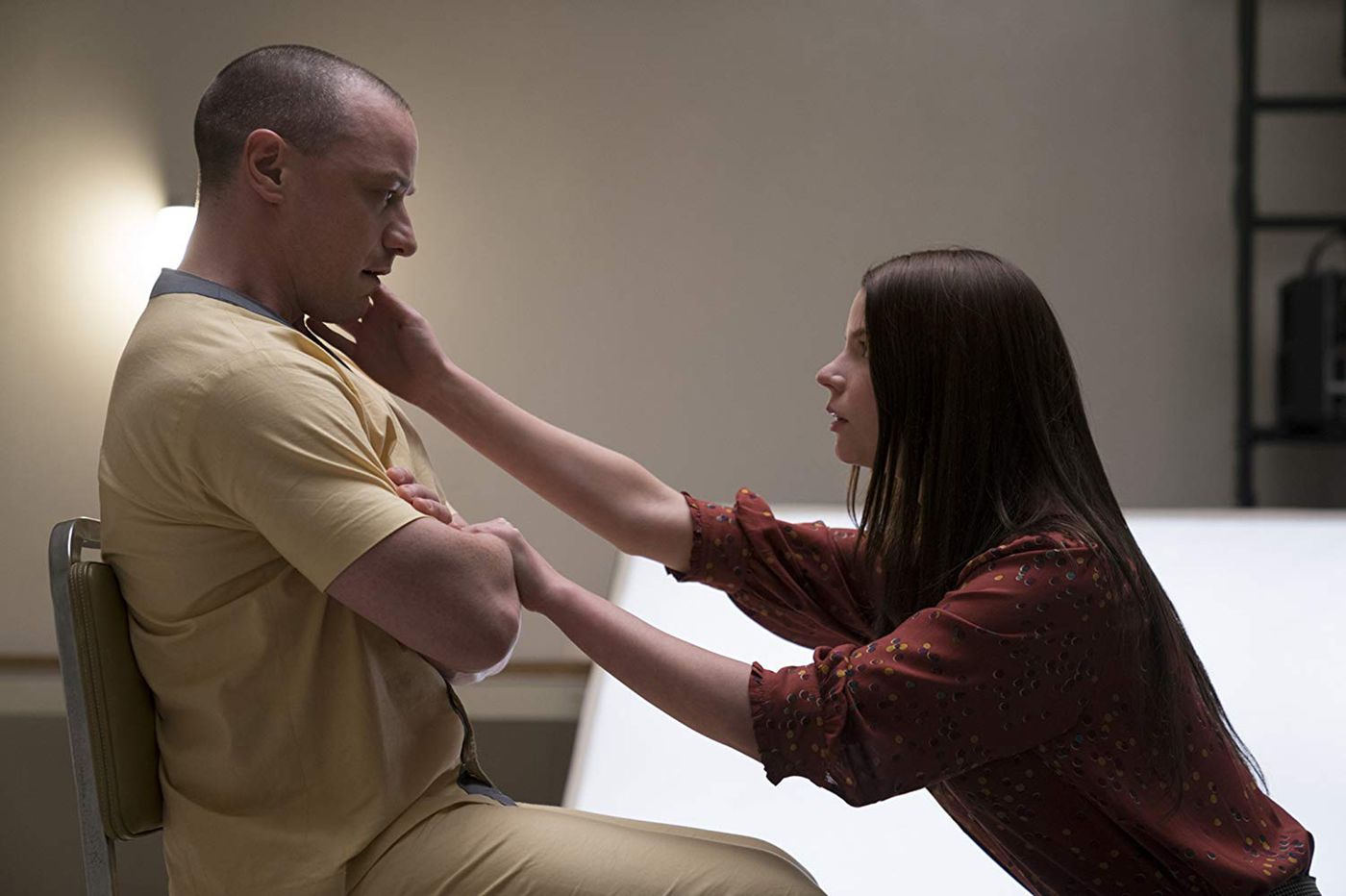
Glass is the third film in a trilogy of films written and directed by M. Night Shyamalan that includes 2000’s Unbreakable and 2017’s Split. The third installment find us thrust into Raven Hill Psychiatric Hospital where David Dunn (Bruce Willis), Kevin Wendell Crumb (James McAvoy), and Elijah Price (Samuel L. Jackson) have all been sent to be evaluated by Dr. Ellie Staple (Sarah Paulson). Dr. Staple will take three days to convince the trio that the superpowers they believe themselves to be imbued with, strength and invulnerablity for Dunn and Crumb, hyper-intelligence for Price, are just reactions to childhood trauma, not powers that make them superheroes. Meanwhile, the friends and family of trio, Casey Cooke (Anya Taylor-Joy), David’s son Joseph (Spencer Treat Clark), and Elijah’s mother (Charlayne Woodard) try to help their loved ones prove their uniqueness in the face of doubt.
M. Night Shyamalan envisioned the Unbreakable trilogy as a grounded tale of superheroes and he has largely accomplished this feat. The films are devoid of the spectacle and action that have come to define the comic book movie genre and instead, aims to deconstruct the concept and study humanity and our nature through the films’ characters. Glass is no exception as it attempts to portray the power of belief and the effect it has on us all. The film explores the power of belief in both the macro and micro senses. At the center of Glass’ theme is the question of whether Kevin, David, and Elijah’s “powers” are innate or are they merely placebos powered by belief, rendering them obsolete if the men are convinced that they are not real. The script and Sarah Paulson’s performance both do a great job of portraying and outlining this argument to the characters and through them, the audience. As Dr. Staple makes her argument both viewers and characters are slowly persuaded; maybe our eyes are playing tricks on us and things aren’t really as they seem? The film’s conclusion is also an argument in favor of its premise that belief among a group is a powerful driving force, as it is revealed to be the motivator for two characters in two separate twists, an M. Night Shyamalan signature. Through both of the characters, the message put forth by Glass is clear; when people believe in something, someone, or each other, humanity becomes capable of reaching great heights and achieving great things and equally, the power of negative reinforcement from those that surround us can cause us to question ourselves and what we’re capable of, quashing anything we could achieve or what we could become; their doubt becoming our own.
This message is also explored on more interpersonal level through the connection shared by Kevin and Casey. The two characters’ share a bond that was touched upon in the ending of Split and is more deeply explored here. Their shares experience of being abused by adult family members allows Casey to break through Kevin’s dissociative identity disorder and directly contact his main personality amidst the 20+ vying for control. Casey believes that Kevin can be redeemed and overcome his supervillain personality “The Beast.” It is this belief in the continued existence of his innocence and goodness that eventually allows for a breakthrough (although with unintended consequences).
James McAvoy returns to his role as Kevin Wendell Crumb and his 20+ personalities including the supervillain “The Beast.” This time, Shyamalan lets McAvoy run wild and unleash more than ten separate characters through the course of the film as personalities for Kevin and the actor does not disappoint. McAvoy plays each personality pretty convincingly, giving them their own accents, voice inflections, and motivations. In one scene, McAvoy runs through nearly ten personalities in one scene, each different from the next. It does feel at times to be slightly overdone in terms of how many times we see Kevin alternate between personalities, but McAvoy performs to perfection each time he’s called upon. This site felt strongly that McAvoy should have been in the Best Actor conversation in 2017 after Split, and he uses Glass to remind us why that was the case. The rest of the ensemble cast all pull their weight as well with Anya Taylor-Joy’s and McAvoy’s chemistry taking center stage and giving the film an additional satisfying subplot. Paulson, Jackson, and Willis are all good as well, providing the lifeblood of the films slower sections.
Glass is a film that certain segments of the general audience may not be prepared for. The first two acts develop slowly, yet with mystery and slight tension as we wonder what Elijah is up to, if the characters at the center are really even superpowered, and what Joseph Dunn has found in his investigating. This time builds on the theme and sets the stage for an explosive third act that ties everything together and provides not one, not two, but three trademark Shyamalan twists. The third act is positioned to be the payoff for following along with the first two-thirds and it does not disappoint. The fully unraveled story, presentation of the film’s message, and ramping up of the action tie everything together and present a satisfying conclusion. The first two acts are mostly powered by the performances of James McAvoy, who wows once again as Kevin Wendell Crumb, Sarah Paulson, Bruce Willis, and Samuel L. Jackson. The ensemble gives it their all and prevent what could have been an hour that bored the audience to the point of no return from doing so. M. Night Shyamalan’s story and direction are well executed with some noteworthy camera work and shots, as well as an homage to Spike Lee’s classic Do The Right Thing (which cinephiles will be sure to spot). The film’s conclusion contains a message that is both interesting and worthy of consideration while also being immensely entertaining. Glass may not be what many were expecting, but our most enjoyable gifts often aren’t.
Image: Universal Pictures

